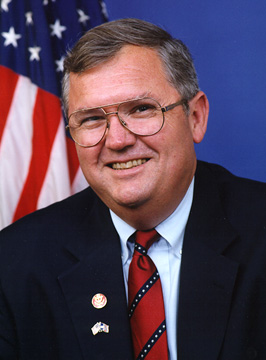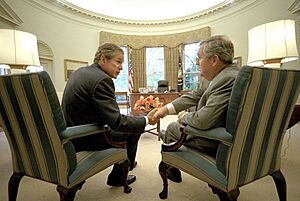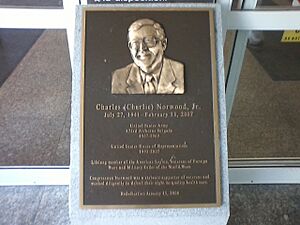Charlie Norwood facts for kids
Quick facts for kids
Charlie Norwood
|
|
|---|---|
 |
|
| Member of the U.S. House of Representatives from Georgia |
|
| In office January 3, 1995 – February 13, 2007 |
|
| Preceded by | Don Johnson |
| Succeeded by | Paul Broun |
| Constituency | 10th district (1995–2003) 9th district (2003–2007) 10th district (2007) |
| Personal details | |
| Born |
Charles Whitlow Norwood Jr.
July 27, 1941 Valdosta, Georgia, U.S. |
| Died | February 13, 2007 (aged 65) Augusta, Georgia, U.S. |
| Resting place | Westover Memorial Park Augusta, Georgia, U.S. |
| Political party | Republican |
| Spouse | Gloria Norwood |
| Alma mater | Baylor School Georgia Southern University (BA) Georgetown University (DDS) |
| Occupation | Dentist |
| Military service | |
| Allegiance | United States of America |
| Branch/service | United States Army |
| Years of service | 1967–1969 |
| Rank | Captain |
| Battles/wars | Vietnam War |
Charles Whitlow Norwood Jr. (July 27, 1941 – February 13, 2007) was an American politician. He was a member of the Republican Party. From 1995 until his death in 2007, he served in the United States House of Representatives. At the time he passed away, Norwood represented the 10th District of Georgia.
Contents
Early Life and Education
Charles Norwood was born in Valdosta, Georgia. He went to Baylor School, which was a military academy in Chattanooga, Tennessee. After that, he studied at Georgia Southern University and Georgetown University. Before becoming a politician, Norwood worked as a successful dentist in Augusta.
He married his wife, Gloria, in 1962. They had two sons, Charles and Carlton. The family lived in Evans, Georgia, a town near Augusta. Norwood was a Methodist.
Serving His Country
Norwood was a captain in the United States Army from 1967 to 1969. He started in the U.S. Army Dental Corps. In 1968, he was sent to South Vietnam. He served with the 173rd Airborne Brigade.
During his time in Vietnam, Norwood helped create new ways to provide dental care to soldiers. He was one of the first dentists to visit soldiers on the front lines. He also helped treat military guard dogs. He even assisted in emergency medical care at field hospitals.
For his brave service, Norwood received the Combat Medical Badge. He also earned two Bronze Stars. After Vietnam, he continued to serve in the Dental Corps until 1969. He remained a member of groups for veterans until his death.
Becoming a Congressman
In 1993, Norwood decided to run for Congress. He sold his dental practice to focus on the 1994 elections. He ran as a Republican in Georgia's 10th District. He won by a large amount against the current Democratic representative. He was the first Republican to represent that area since the Reconstruction.
Norwood won his elections again in 1996, 1998, and 2000. In 2002, the district lines were changed. His district became the 9th District. Even with the changes, he was reelected with a lot of votes.
In 2004, Norwood won again with 74 percent of the votes. In 2006, his district was renumbered as the 10th District again. He was easily reelected, getting 68 percent of the votes.
Considering Higher Office
People thought Norwood might run for Governor of Georgia in 2002 or for the United States Senate in 2004. However, he decided not to run. He said it was because of his health.
What He Did in Congress
Norwood strongly believed in controlling who enters the country. He suggested putting many troops at the U.S.-Mexico border. He also helped create a rule that stopped people who were not legally in the country from getting certain health benefits.
He worked hard to create a "patients' bill of rights." This bill aimed to give people better access to health care. It also wanted to give them more power to take legal action against health insurance companies. This bill passed the House of Representatives twice. However, it did not become a law.
Norwood also believed the government should not interfere too much in people's lives or businesses. He voted against renewing the Voting Rights Act of 1965 in 2006. He felt that parts of the act unfairly targeted Southern states because of past issues. He also did not want to change Georgia's state flag to remove symbols related to the Confederacy.
His Later Years and Legacy
In 1998, Norwood was diagnosed with a lung disease called idiopathic pulmonary fibrosis. He kept this a secret at first. In 2004, he had a lung transplant. A year later, doctors found a cancerous tumor on his other lung. He received chemotherapy for it. By December 2006, the cancer had spread. Doctors believed the cancer was caused by medicines he had to take after his lung transplant.
In January 2007, President George W. Bush mentioned Norwood during a speech. He wished him a quick recovery. On February 7, Norwood's office announced he would stop cancer treatment. He returned home for hospice care.
Norwood passed away on February 13, 2007. The House of Representatives observed moments of silence for him. He was survived by his wife, two children, and four grandchildren. President Bush said Norwood was a good friend and a strong leader.
To honor his service, the Veterans Affairs Medical Center in Augusta, Georgia, was renamed. On January 15, 2008, it officially became the Charlie Norwood VA Medical Center.
See also
- List of United States Congress members who died in office (2000–)#2000s
 | Kyle Baker |
 | Joseph Yoakum |
 | Laura Wheeler Waring |
 | Henry Ossawa Tanner |



